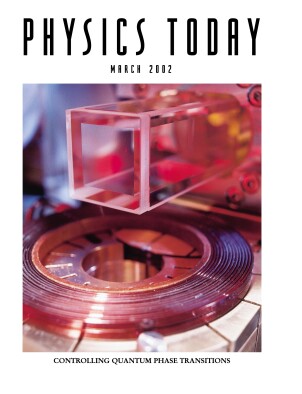‘Pipeline’ Provides Physicists with Flexibility
DOI: 10.1063/1.1472375
I read with interest the articles on careers for physicists in the
I have a PhD, postdoctoral research experience, and more than 10 years’ full-time university, college, and even high-school teaching experience. My observation is that today’s students are wiser than students of the not-so-distant past, more cognizant of economic and political realities. For instance, I received the Society of Physics Students careers poster shown in Barrett Ripin’s article in the same magazine (
My opinion is that the overarching reason to pursue a physics degree is interest in physics and the politics of physics research, although I realize that graduate programs in physics and other technical fields are attractive to foreign students who also wish to gain a foothold in the US. Physics educators encourage more undergraduate majors by emphasizing exciting teaching and research. Graduate programs with well-defined times for degree completion and a climate in which journeyman researchers believe that they can meet their career goals will improve both morale and enrollment numbers at higher educational levels. Insinuating that it takes a PhD in physics to solve certain challenging industrial and business problems is likely to be counterproductive.
We must do more to educate the American public about physics itself. People may link physics and national security far less tightly than in the past. For instance, in the community of my youth in the 1960s and 1970s, people thought that physics was hard and that physicists “learned to build better bombs.” Now all that seems to remain is the thought that physics is hard. I believe that clearly defining physics to the public will, at the very least, boost high-school and undergraduate enrollments.
We saw in 2001 that a sudden economic bear market and layoffs in the technology sector make future job prospects uncertain at all times. I hope the physics community will steer away from tired concepts such as a bull market of jobs and a physics pipeline. I look forward to future articles in Physics Today that point in new directions.
More about the authors
Kurt T. Bachmann, (kbachmann@mmcable.com) Norman, Oklahoma, US .




